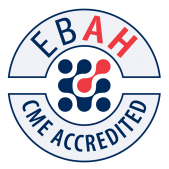EHA-SWG Scientific Workshop on From Aging Hematopoietic Stem Cells to Age-related Diseases: Opportunities for Intervention
Dates: November 13-15, 2025
Location: Barcelona, Spain
Chairs: M Essers, E Laurenti, S Valletta, K Kirschner
Collaborating SWG: EHA Specialized Working Group (SWG) on Stem Cells and SWG on Aging
Join leading experts in hematopoietic stem cell (HSC) biology and aging, and clinical care for a comprehensive workshop addressing age-related hematologic disorders. This event bridges cutting-edge science with clinical practice, fostering collaboration between researchers, clinicians, and patient advocates. These communities will merge their knowledge to share a program that ranges from basic scientific topics on HSC biology to clinical research on therapeutic and preventive strategies.
Program
The program will join basic research on understanding HSC biology and aging process to the care of hematologic disorders in the elderly and in individuals at risk of aging-related disorders.
Key topics will include:
- Advances in understanding HSC aging, senescence, and clonal hematopoiesis
- Biomarkers of aging and disease progression, including clocks for predicting aging and longevity
- The impact of immunosenescence and inflammaging on clonal outgrowth, aging and disease
- Cellular senescence and the impact of senolytics to eliminate senescent cells
- Strategies for identifying at-risk individuals and developing preventive therapies
The scientific need for this workshop arises from the HSC aging community and practicing clinicians often operating in silos, with limited opportunities for fruitful interaction, especially at the more junior level.
Capped to 60 participants, this workshop will include a mix of lectures and dynamic discussions. All selected applicants will be invited to present their research, covering the following topics:
- Hematopoietic stem cell aging (mechanism, intrinsic and extrinsic regulators)
- Age-related senescence
- Clonal hematopoiesis
- Biomarkers of aging
- Age-related interventions and clinical trials
Learning objectives
After attending this workshop, participants will be able to:
- Gain insights into how hematopoietic cells and the bone marrow
- Understand how microenvironment change with age, and how these changes contribute to aging and age-related diseases
- Understand the pathophysiology of hematologic disorders in the elderly
- Discuss the last experimental models used to study aging of the hematopoietic system
- Understand the challenge of identifying individuals at highest risk of age-related hematologic disorders, and the strategies to mitigate this risk
- Identify the barriers for clinical data generation in the aging population
Target audience
The workshop is intended for hematologist-oncologists, non-malignant hematologists, transplant specialists, research scientists and patient advocates.
Meeting categories
Basic, Translational and Clinical
EHA Curriculum sections covered
Primary
Cellular and molecular biology of hematopoietic cells. Management of elderly and unfit patients.
Secondary
BM failure. Myeloid malignancies: Pre-malignant clonal cytopenias, Myeloproliferative neoplasms, MDS/MPNs, Myelodysplastic syndromes, AML. Lymphoid malignancies: B-cell neoplasms, T-cell and NK-cell neoplasms, Hodgkin lymphoma. Treatment of hematologic conditions: Specific treatments, Transplantation and cellular therapies, Prevention and treatment of infectious diseases, Supportive care.
Registration
Registration is now open; please visit the registration and accommodation page for more details.
Abstract & clinical case submission
Abstract submission is now open
Abstract & clinical case submission is an important part of this workshop; please visit the abstract submission and travel grant page for more details.
Venue
H10 Marina Barcelona
Olympic Village, Av. del Bogatell, 64-68, Sant Martí,
08005 Barcelona
Spain
EBAH

Continuing Medical Education (CME) is widely accepted to encourage individual practitioners to maintain and develop professional knowledge and skills keeping up-to-date with latest developments within the field. The workshop will be accredited by the EBAH system. Participants of this workshop are eligible to receive one Continuing Medical Education (CME) credit point for every hour of accredited activity from the EBAH system.
More on this topic from EHA
- Listen to Dr Krzysztof Szade discussing “Hematopoietic stem cells in health, aging and malignancies: focus on metabolism” in our EHA Unplugged podcast series.
- EHA members can explore the clinical and pathophysiological peculiarities of hematologic conditions in the frail and elderly patients in our comprehensive Program “Hematology of the Aging Patient: Dispelling Myths” on the EHA Campus.
- If you're not yet an EHA member, you can find out about the benefits of joining our vibrant global community by visiting our membership pages.



 Back
Back